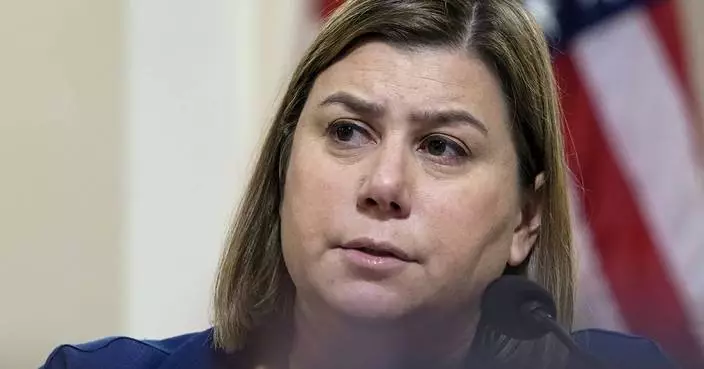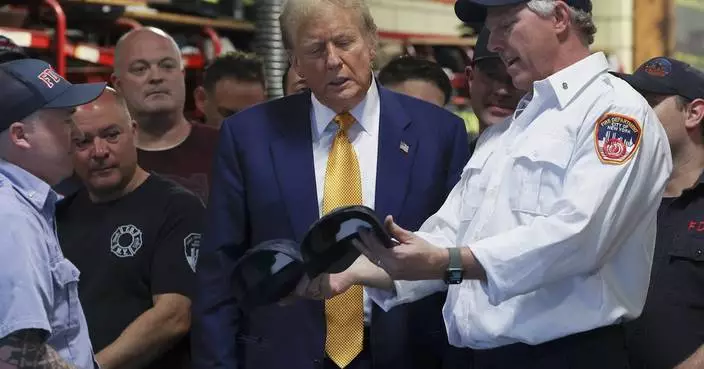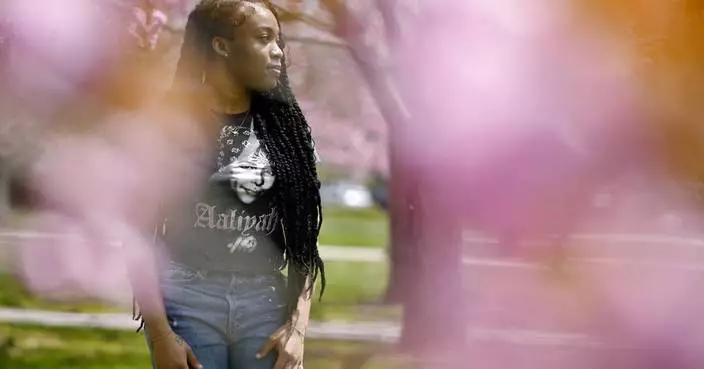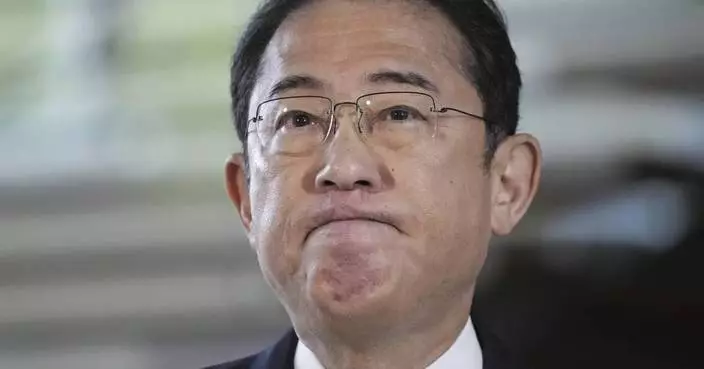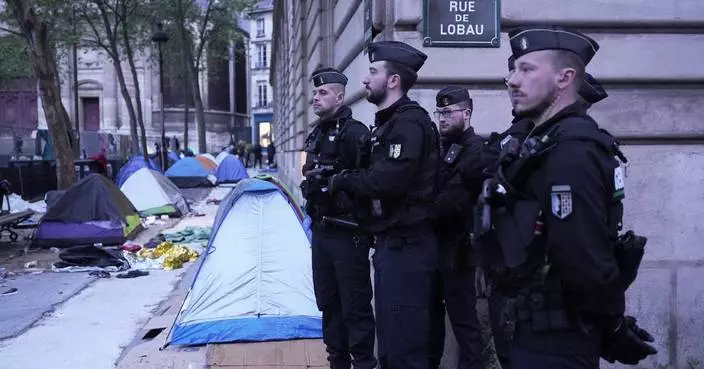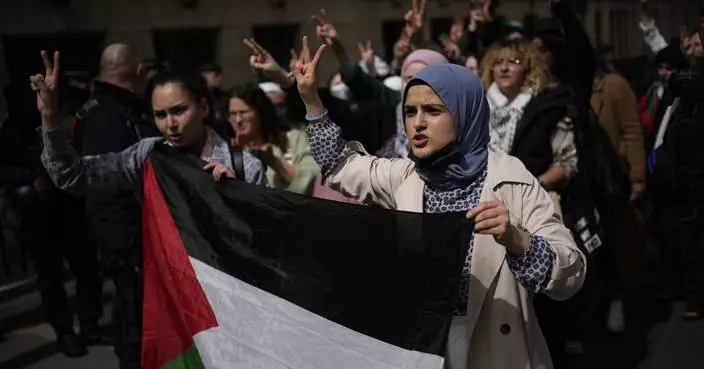Taking turns sliding across the rain-soaked turf holding the World Cup trophy tight, teenager Kylian Mbappe and the rest of France's players acted like the youthful bunch they are.
Nothing, not a Pussy Riot protest nor a postgame downpour that soaked Russian President Vladimir Putin, was going to stop the party.
It carried on long after a thrilling 4-2 win over Croatia on Sunday. In the locker room with French President Emmanuel Macron striking poses with players, then a champagne-spraying, water-splashing interruption of the coach Didier Deschamps' news conference.
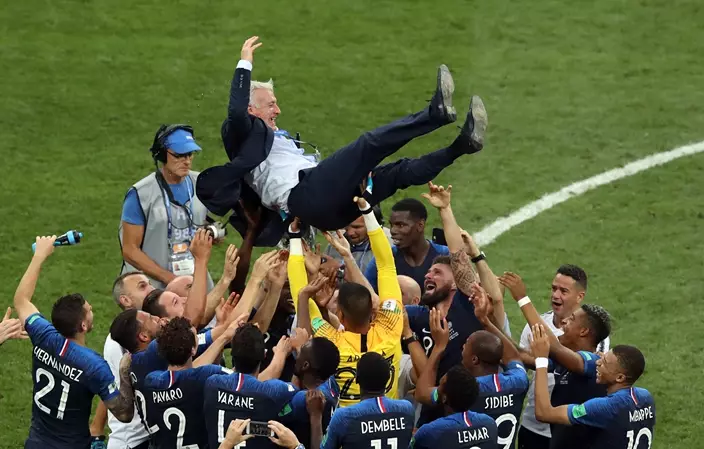
French players throw France head coach Didier Deschamps into the air celebrating at the end of the final match between France and Croatia at the 2018 soccer World Cup in the Luzhniki Stadium in Moscow, Russia, Sunday, July 15, 2018. (AP Photo/Thanassis Stavrakis)
"Sorry! They're young and they're happy," said Deschamps, like a proud father.
Deschamps had good reason to indulge them. His team is mostly aged 25 or under and can return almost intact to defend their title in 2022 in Qatar.
"Our children are going to be very proud," forward Antoine Griezmann said. "The World Cup, it's a lot."
The 19-year-old Mbappe became only the second teen after Pele to score in a World Cup final.
Mbappe had just shown his electrifying speed in the 52nd minute when play was held up by four protesters who ran onto the field. Russian punk band Pussy Riot later took credit for the incident — watched from the VIP seats by Putin, whose government once jailed members of the activist group. Charges were filed against the group Sunday, too.
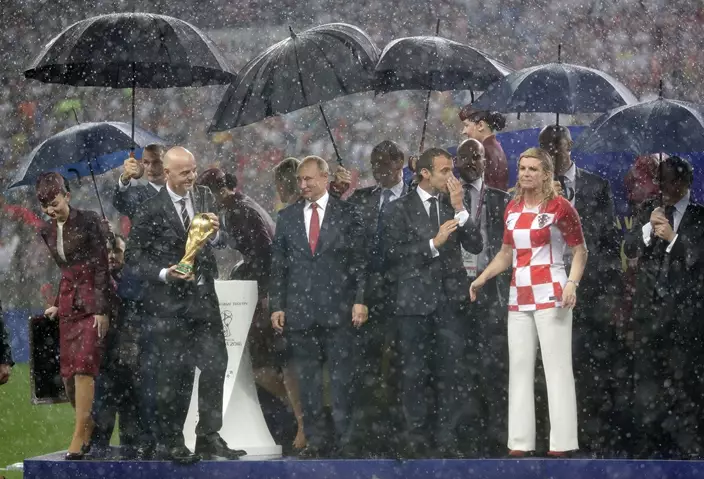
FIFA President Gianni Infantino, Russian President Vladimir Putin, French President Emmanuel Macron and Croatian President Kolinda Grabar-Kitarovic, from left, stand for the presentation in the rain after the final match between France and Croatia at the 2018 soccer World Cup in the Luzhniki Stadium in Moscow, Russia, Sunday, July 15, 2018. France won the final 4-2. (AP Photo/Matthias Schrader)
Putin was later on the field to award medals to the players in a ceremony soon drenched in rain and joy. As thunder pealed and lightning cracked, FIFA president Gianni Infantino handed France captain Hugo Lloris the gold World Cup trophy.
Gold confetti stuck to the soaked Les Bleus as they paraded the trophy around the Luzhniki Stadium, a final act of an enthralling tournament in which Croatia reached its first final while powers Brazil, Germany and Argentina went home early.
About 12 minutes after a protester gave Mbappe a double high-five on the field, Mbappe sent a right-footed shot from 25 yards (meters) past goalkeeper Danijel Subasic . The goal put France up 4-1, closing the door on Croatia who had been the better team until Mbappe took control.
The only other teen to score in a World Cup final was Pele, who was 17 when Brazil beat Sweden 5-2 in 1958.
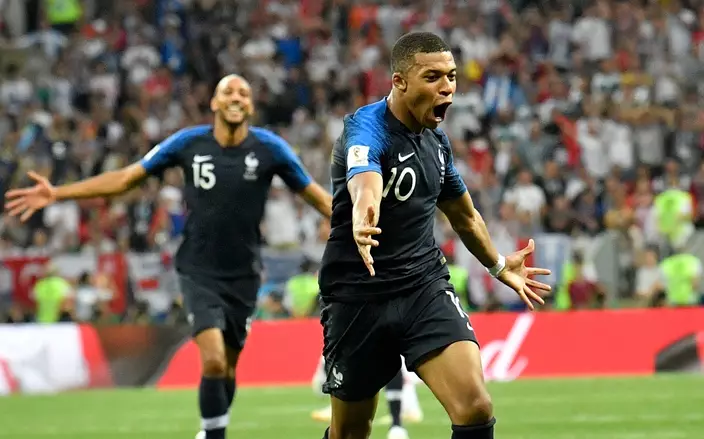
France's Kylian Mbappe, front, celebrates after scoring his side's fourth goal during the final match between France and Croatia at the 2018 soccer World Cup in the Luzhniki Stadium in Moscow, Russia, Sunday, July 15, 2018. (AP Photo/Martin Meissner)
Mbappe, who plays for Paris Saint-Germain in the French league, was born months after France won its only other World Cup title in 1998.
"I have a whole story to write," Mbappe said. "This is just the beginning."
Paul Pogba and Griezmann, France's two other key creative players, also scored. Pogba played a disciplined role in Russia, but his natural joy was evident celebrating his 18-yard (meter) shot, and leading the champagne shower for Deschamps.
But it was Mbappe who put the match out of reach with a furious passage of play in the second half. In the 59th, a run from Mbappe started a play that ended up with Pogba on the edge of the penalty area. With his second attempt, the midfielder curled his shot beyond Subasic.
Griezmann scored from the penalty spot in the 38th minute fully four minutes after his corner kick was knocked out of play by Ivan Perisic's arm. The referee ruled it handball only after a video review, just as the first thunders claps boomed around the stadium.
"In a World Cup final, you do not give such a penalty," Croatia coach Zlatko Dalic said.
France took the lead in the 18th when Croatia's tallest outfield player, 1.90-meter (6-foot-3) forward Mario Mandzukic, rose to meet Griezmann's free kick with the top of his head. He deflected it past his own goalkeeper.
Perisic and Mandzukic both scored for Croatia, first to equalize in the 28th minute and later as a consolation goal in the 69th, embarrassing Lloris with a flicked shot as the France goalkeeper tried to dribble the ball out of his goalmouth.
But the three-goal lead was too much for the red-and-white-checkered squad that made a habit of coming back at the World Cup — and played three straight 120-minute games before the final.
"We were dominant, we had control," Dalic said through a translator. "What we've had in terms of luck over the tournament, we lacked that today."
Deschamps became only the third man to win the World Cup as a player and a coach. He joined Mario Zagallo of Brazil and Franz Beckenbauer, who captained West Germany.
France's captain 20 years ago, Deschamps was lifted up by his players on the field and flung into the air several teams and caught. The normally staid coach did a few skipping dance steps in the rain before stopping and laughing at himself.
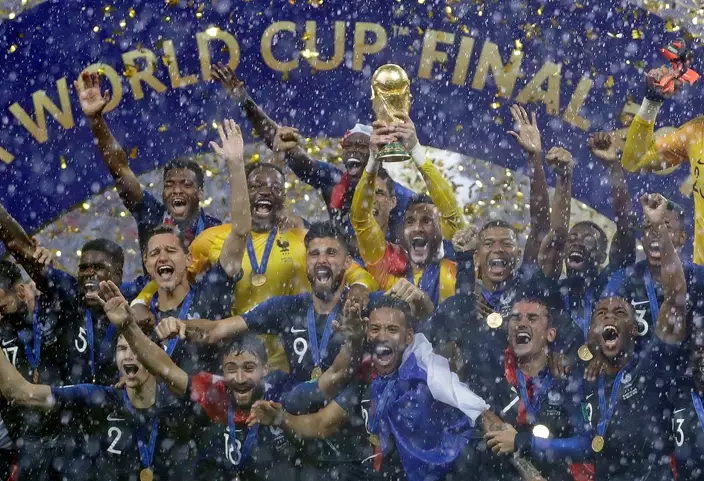
France goalkeeper Hugo Lloris holds the trophy aloft after the final match between France and Croatia at the 2018 soccer World Cup in the Luzhniki Stadium in Moscow, Russia, Sunday, July 15, 2018. France won the final 4-2. (AP Photo/Matthias Schrader)
It was that kind of unbridled evening for the French who won with an exuberance not often seen in a mostly efficient, controlled title run.
Back home in France, tens of thousands of fans headed to the Eiffel Tower to watch a broadcast on giant screens that Paris police closed the area more than two hours before kickoff.
Two years ago at home, France flopped in a European Championship final it was expected to win against Portugal.
"But maybe if we had been European champions we would not be champions today," Deschamps said.
PRESIDENTS' CLUB
Putin watched the game in a VIP section with the presidents of France and Croatia, Emmanuel Macron and Kolinda Grabar-Kitarovic.
Macron paced nervously out of his seat during the video review, and kissed his Croatian counterpart on both cheeks to console her after the game. They joined the medal ceremony and both kissed the gold trophy before it got to Lloris.
FINAL GOALS
The two previous finals were 0-0 after 90 minutes before being settled with a single goal deep into extra time.
Three goals in the first half was the most prolific since 1974, when West Germany went into the break up 2-1 against the Netherlands. That was the final score.
The six-goal final was the most since England beat West Germany 4-2 in 1966. It also ensured the 2018 World Cup had only one scoreless game, when France last played at Luzhniki Stadium against Denmark.
The military defector was killed in a hail of gunfire and then run over by a car in Spain. The opposition figure was struck repeatedly with a hammer in Lithuania. The journalist fell ill from a suspected poisoning in Germany.
Since President Vladimir Putin launched his invasion of Ukraine, attacks and harassment of Russians — prominent or not — have been blamed on Moscow's intelligence operatives across Europe and elsewhere.
Despite attempts by Western governments to dismantle Russian spy networks, experts say the Kremlin apparently is still able to pursue those it perceives as traitors abroad in an attempt to silence dissent. Opponents of Putin increasingly fear the long arm of Moscow’s security services, including in countries they once thought were safe.
“We just escaped Russia and had this illusion that we’ve escaped prison,” said journalist Irina Dolinina, who works for the independent outlet Important Stories, based in the Czech capital of Prague.
Dolinina and colleague Alesya Marokhovskaya were harassed in 2023, leading to fears they were under surveillance. They were sent threatening messages via comments on the media outlet's website and told not to travel to a conference in Sweden. To underscore the point, the threat included their airline ticket numbers, seat locations and hotel booking.
“It was a mistake for us to think that here, we are safe,” Dolinina told The Associated Press.
The Kremlin, which routinely denies going after its opponents abroad, has been blamed for decades for such attacks.
The most famous cases include Soviet revolutionary-turned-exiled dissident Leon Trotsky, who was killed in 1940 in Mexico after being attacked with an ice ax by a Soviet agent, and Georgi Markov, a dissident working for the BBC's Bulgarian language service, who died in 1978 in London after being jabbed with a poison-tipped umbrella.
Britain was the site of other poisonings blamed on Russian security services under Putin. Defector and former intelligence officer Alexander Litvinenko died after drinking tea laced with radioactive polonium-210 in 2006, and former spy Sergei Skripal and his daughter fell gravely ill but recovered following an attack with a Soviet-era nerve agent in 2018. The Kremlin repeatedly denied involvement in the British cases.
Now, with a full-scale domestic crackdown underway inside Russia, most of the Kremlin's political opponents, independent journalists and activists have moved abroad. There are strong suspicions, as well as accusations from officials, that Moscow is increasingly targeting them.
The breadth of those individuals pursued by Russia, “even if they look and sound completely insignificant,” is because Russian authorities believe they “might come back to the country and destroy it completely,” said security expert Andrei Soldatov.
There are multiple reports of exiles being persecuted not only in former Soviet countries with a large Russian diaspora but also in Europe and beyond.
Activists and independent journalists have reported symptoms that they suspect to be poisoning.
Investigative journalist Elena Kostyuchenko fell ill on a train from Munich to Berlin in 2022, and German prosecutors later said they were investigating it as an attempted killing.
Natalia Arno, the head of the U.S.-based Free Russia Foundation, told AP she still suffers from nerve damage after a suspected poisoning in Prague in May. She believes Russian security services tried to “silence” her because of her pro-democracy work.
In an especially brutal incident, the bullet-riddled body of pilot Maksim Kuzminov was found in La Cala, Spain, near the eastern port of Alicante, after being shot and run over with a car. Threats against him surfaced soon after he stole a Russian Mi-8 helicopter in August, flew it to Ukraine and defected.
Kuzminov, 33, became a “moral corpse” the moment he planned his “dirty and terrible crime,” said Sergei Naryshkin, head of Russia’s foreign intelligence service.
In March, Leonid Volkov, chief of staff to the late opposition politician Alexei Navalny, had his arm broken in a hammer attack in the Lithuanian capital Vilnius.
Lithuania's security service said the assault was probably “Russian-organized and implemented." On April 19, Polish police detained two people on suspicion of attacking Volkov on the orders of a foreign intelligence service.
In the decades Putin has held power, the Kremlin has denied multiple times that it is targeting its enemies at home and abroad. It has not commented on the suspected poisonings and Putin's spokesman, Dmitry Peskov, declined comment on Volkov's case, saying it was a matter for Lithuania's Interior Ministry.
Even fledgling anti-war groups find themselves in Moscow's sights.
Russians in Stockholm, Sweden, who in May 2022 formed one of the first organizations to support Ukraine and political prisoners, burned an effigy of Putin labeled “war criminal” outside the Russian Embassy.
Six months later, Russian authorities designated the group an undesirable organization, threatening members with fines and prison. Their relatives were visited at home in Russia by police, and their personal data was leaked, members told AP, speaking on condition of anonymity because of fears for their security.
The Russian Orthodox Tsargrad media outlet suggested the group’s members could be recruited by foreign intelligence services and dubbed them “terrorists.” The pro-Kremlin outlet warned them of a nasty surprise if they continued opposing the war.
Days later, while visiting relatives in St. Petersburg, a group member named Marina said a police car stopped right in front of her as she exited a shop. Three men got out, asked for her documents, forced her into the car and drove to a police station, siren blaring.
“It was really scary. How the hell did they know my exact location?” Marina told AP, declining to give her surname because she fears for her safety.
She was confronted with the leaked data and video of the embassy protest, and investigators demanded she identify other members of the group, reveal its funding source and asked her views on the war. One even questioned why she was leaving Russia before her father’s birthday -– making clear they knew the identity of her family.
She was charged with an administrative violation, usually punishable by a fine. As police prepared to drive her to her parents’ apartment, it was suggested she “cooperate” and become an informant if she wanted to see her family again without fear of detention, Marina said.
“It’s a known modus operandi for Russian intelligence and the Russian regime to follow opponents in the Russian diaspora in other countries and subject them to different types of harassment or intelligence work,” Fredrik Hultgren-Friberg, spokesperson for the Swedish Security Service, told AP.
Soldatov said the Kremlin is going after a wide range of opponents because it fears pro-Western uprisings like those in Georgia and Ukraine and wants to prevent the seeds of dissent from growing into “something new.”
Even though Western countries expelled hundreds of Russian spies in coordinated actions after the 2018 poisoning of the Skripals and the 2022 invasion of Ukraine, Russians abroad say they are concerned Moscow still can reach them.
Marokhovskaya, the investigative journalist in Prague, received anonymous threats, including one indicating close surveillance that said, “We’ll find her wherever she walks her wheezing dog.”
She and Dolinina told AP they experienced such observation inside Russia, including after publishing award-winning investigations of corruption in Putin’s family.
After moving to Europe, Dolinina said she initially thought she was experiencing “constant paranoia.” When she got the anonymous threats and was followed on Prague's streets, however, she realized the fears were well-founded.
Neither journalist has concrete proof that Russian security services targeted them, but they said they believe the personal data -– flight information, passport numbers and home addresses -– and physical surveillance were likely orchestrated by a state actor.
“I was really shocked that it’s happening in Europe,” Dolinina said.
Although the many incidents the West blames on the Kremlin fuel speculation that Moscow still can intimidate Russians abroad, not everyone has been silenced.
“This is not the reason to quit,“ Marokhovskaya said. "It’s the reason to keep working.”

FILE - Russian defector Maksim Kuzminov attends a news conference in Kyiv, Ukraine, on Tuesday, Sept. 5, 2023. Spanish police say the bullet-riddled body of a man found in a Spanish town was that of Kuzminov, 33, who flew a Russian military helicopter across the front lines into Ukraine last year. Sergei Naryshkin, head of Russia's foreign intelligence service, said Kuzminov became a "moral corpse" from the moment he planned his "dirty and terrible crime." (AP Photo/Vladyslav Musiienko, File)

FILE - Leonid Volkov, chief of staff for the late Russian opposition leader Alexei Navalny watches a session of the European Parliament in Strasbourg, France, on Dec. 15, 2021. Volkov had his arm broken by an attacker wielding a hammer in Vilnius, Lithuania, in March. Lithuania's security service said the assault was probably "Russian-organized and implemented." (AP Photo/Jean-Francois Badias, File)

FILE - Yulia Skripal poses during an interview in London, on Wednesday, May 23, 2018. She and her father, Sergei Skripal, were found slumped on a bench in Salisbury, England, in March 2018. Sergei Skripal lived there after being released from prison in Russia in a spy swap. British investigators said they had been poisoned with a Russian-developed nerve agent and blamed Moscow for the attack. Moscow denied the allegations. (Dylan Martinez/Pool via AP, File)

FILE - Police officers guard a supermarket parking facility near where former spy and defector Sergei Skripal and his daughter were found critically ill following exposure to the Russian-developed nerve agent Novichok in Salisbury, England, on Tuesday, March 13, 2018. The British government accused Russia of attempted murder in the poisonings. Two men identified by authorities as carrying out the attack denied any involvement and told Russian television they were simply tourists. (AP Photo/Matt Dunham, File)

FILE – Russian defector Alexander Litvinenko, a former operative for the KGB and FSB, is seen at his home in London, on Friday, May 10, 2002. Litvinenko was viewed as a traitor by the Kremlin after fleeing to Britain in 2000. He died after drinking tea laced with radioactive polonium-210 at a hotel in London. On his deathbed, Litvinenko claimed that Russian President Vladimir Putin directly ordered his assassination. A British inquiry later found that Russian agents had killed Litvinenko, probably with Putin's approval. (AP Photo/Alistair Fuller, File)












